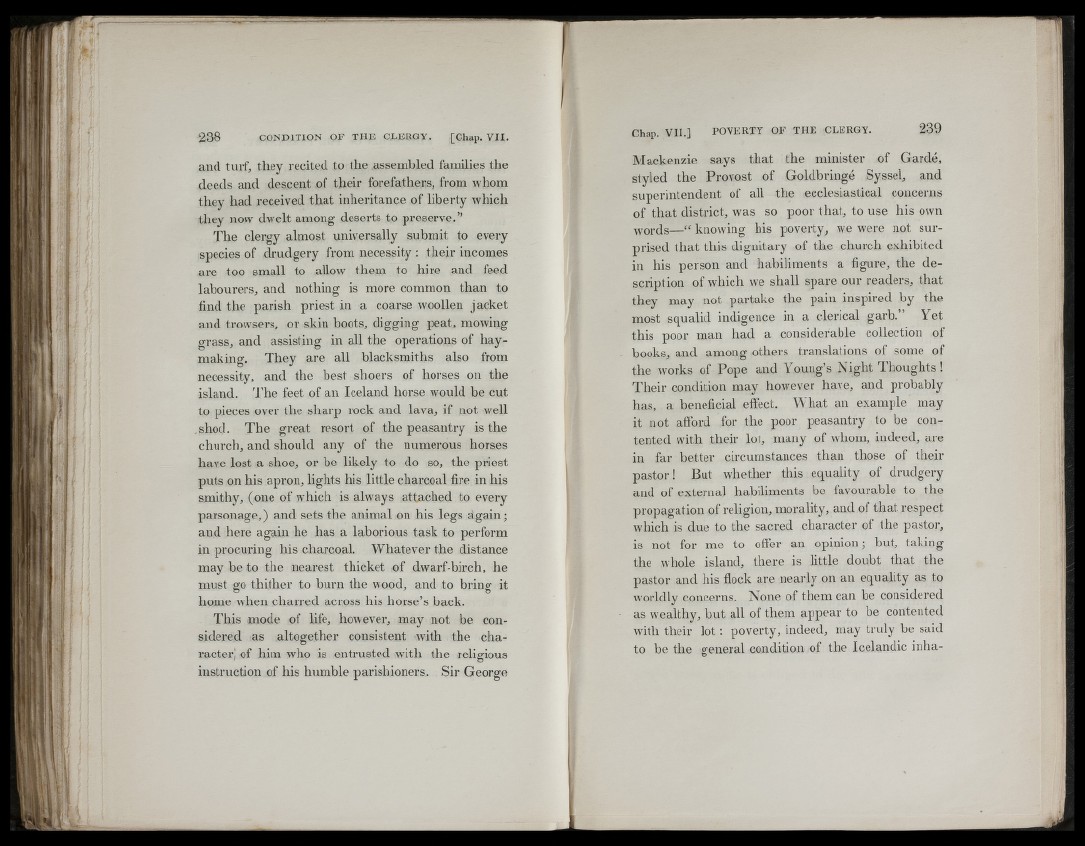
■ ! '-'Si ;
and turf, they recited to the assembled families the
deeds and descent of their forefathers, from whom
they had received that inheritance of liberty which
they now dwelt among deserts to preserve.”
The clergy almost universally submit to every
species of drudgery from necessity : their incomes
are too small to allow them to hire and feed
labourers, and nothing is more common than to
find the parish priest in a coarse woollen jacket
and trowsers, or skin boots, digging peat, mowing
grass, and assisting in all the operations of haymaking.
They are all blacksmiths also from
necessity, and the best shoers of horses on the
island, d’he feet of an Iceland horse would be cut
to pieces over the sharp rock and lava, if not well
shod. The great resort of the peasantry is the
church, and should any of the numerous horses
have lost a shoe, or be likely to do so, the priest
puts on his apron, lights his little charcoal fire in his
smithy, (one of which is always attached to every
parsonage,) and sets the animal on his legs again;
and here again he has a laborious task to perform
in procuring his charcoal. Whatever the distance
may be to the nearest thicket of dwarf-birch, he
must go thither to burn the wood, and to bring it
home when charred across his horse’s back.
This mode of life, however, may not be considered
as altogether consistent with the cha-
racterj of him who is entrusted with the religious
instruction of his humble parishioners. Sir George
Mackenzie says that the minister of Gardé,
styled the Provost of Goldbringe Syssel, and
superintendent of all the ecclesiastical concerns
of that district, was so poor that, to use his own
avords—“ knowing his poverty, we were not surprised
th a t this dignitary of the church exhibited
in his person and habiliments a figure, the description
of which we shall spare our readers, that
they may not partake the pain inspired by the
most squalid indigence in a clerical garb. Yet
this poor man had a considerable collection of
hooks, and among others translations of some of
the works of Pope and Young’s Night Thoughts !
Their condition may however have, and probably
has, a beneficial effect. What an example may
it not aftord for the poor peasantry to be contented
with their lot, many of whom, indeed, are
in far better circumstances than those of their
pastor! But whether this equality of drudgery
and of external habiliments be iavourable to the
propagation of religion, morality, and of that respect
which is due to the sacred character of the pastor,
is not for me to offer an opinion; but, taking
the whole island, there is little doubt that the
pastor and his flock are nearly on an equality as to
worldly concerns. None of them can be considered
as wealthy, but all of them appear to be contented
with their lot ; poverty, indeed, may truly be said
to be the general condition of the Icelandic inha